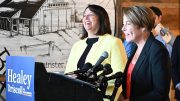 Imagine being denied access to a loved one who is critically ill or dying. For the more than 9 million lesbian, gay, bisexual and transgender (LGBT) people in the United States, access to a loved one during serious illness — one of the most emotionally-difficult and life-altering events — is not always the rule.
Imagine being denied access to a loved one who is critically ill or dying. For the more than 9 million lesbian, gay, bisexual and transgender (LGBT) people in the United States, access to a loved one during serious illness — one of the most emotionally-difficult and life-altering events — is not always the rule.
Researchers at the University of Washington are working to understand the current experiences of LGBT couples when one partner is seriously ill. They are hoping that their results will inform public policies, ensuring that LGBT couples have access to their partners and can participate in critical decision-making.
Ruth Engelberg, PhD, UW research associate professor of medicine and co-director of the End-of-Life Care Research Program, is the principal investigator of a study funded by the National Palliative Care Research Center. LGBT people across the country will be surveyed about their experiences when a partner is hospitalized. The goal of the study is to learn more about people’s experiences when making care decisions for their partner.
“Anecdotally, we are hearing that hospitals and care facilities are not always recognizing the rights of LGBT couples when they are trying to identify legal next of kin,” said Engelberg. “This failure to recognize LGBT partners as appropriate decision makers adds another element of stress, in an already stressful situation, when that partner is either denied access or questioned inappropriately.”
Engelberg is seeking to recruit 100 LGBT people across the country who have had the experience of advocating for a partner who was ill or injured over the past five years and received care in a hospital or other healthcare facility. To determine eligibility, people are asked to contact the study to answer several questions. The study hopes to capture both good and bad experiences.
Engelberg says that she is especially interested in hearing from LGBT people who identify with groups that may be underrepresented in research, such as people of color and older people.
“There are many LGBT couples who have been in same-sex relationships for years and years,” she said. “Then one of them falls seriously ill and the partner feels that she/he must stand back in the shadows because she/he isn’t ‘legally’ the next of kin — even though they have been in a loving relationship for years.”
Across the country, LGBT pioneers have been giving voice to the legal rights of individuals involved in long-term partnerships. In 2010, Janice Langbehn, a Washington state resident, was given the Presidential Citizen’s Medal by President Obama for her efforts to bring attention to the discrimination that LGBT couples face at the end of life. Langbehn, her partner Lisa Pond, and their children were on vacation in Florida when Pond unexpectedly became hospitalized. Despite having executed advanced directives, Pond’s partner and children were denied access to her while she lay dying because the hospital did not recognize Langbehn as legal next of kin.
Charlene Strong, another Washington state resident, has pressed for legislation to expand LGBT rights. Strong’s interest is partly due to her experiences when her long-term partner, Kate Fleming, became trapped and drowned in the basement of their Seattle home. When Strong arrived at the emergency room, her legal standing was challenged and she was unable to act as her partner’s decision-maker.
“Our goal is to better understand the experiences of LGBT people as decision-makers for their partners within our healthcare system,” said Engelberg, “and to spark reform to ensure that we are all able to make critical and important healthcare decisions for our loved ones.”
For individuals interested in taking part in the study, please call toll free 1.877.749.3970 or email info@caringforpartners.org. Visit the website: www.caringforpartners.org Eligible participants may choose to complete the interview by phone, in-person or anonymously on the web; however, participants who elect to participate and share their name will receive a $15 stipend. Confidentiality is ensured.
About UW Medicine
UW Medicine trains health professionals and medical scientists, conducts research to improve health and prevent disease worldwide, and provides primary and specialty care to patients throughout Seattle/King County and the WWAMI ( Washington, Wyoming, Alaska, Montana and Idaho ) region. UW Medicine includes: Harborview Medical Center, Northwest Hospital & Medical Center, Valley Medical Center, UW Medical Center, UW Neighborhood Clinics, UW Physicians, UW School of Medicine and Airlift Northwest. UW Medicine also shares in the ownership and governance of the Seattle Cancer Care Alliance with Seattle Children’s Hospital and Fred Hutchinson Cancer Research Center and shares in ownership of Children’s University Medical Group with Seattle Children’s Hospital.
UW Medicine has major academic and service affiliations with Seattle Children’s Hospital, Fred Hutchinson Cancer Research Center , the Veteran’s Affairs Puget Sound Health Care System in Seattle, and the VA Hospital in Boise, Idaho. The UW School of Medicine has been ranked No. 1 in the nation in primary-care training for the past 18 years by US News & World Report. It is the top public institution for receipt of biomedical research funding from the National Institutes of Health (NIH) and second among all institutions for NIH funding, public and private. UW Medicine’s 2,000 full-time faculty and nearly 5,000 volunteer and part-time faculty include four Nobel Laureates, 32 members of the National Academy of Sciences, and 33 members of the Institute of Medicine. For more information, visit UW Medicine. Follow us on Twitter – @UWMedicineNews.







